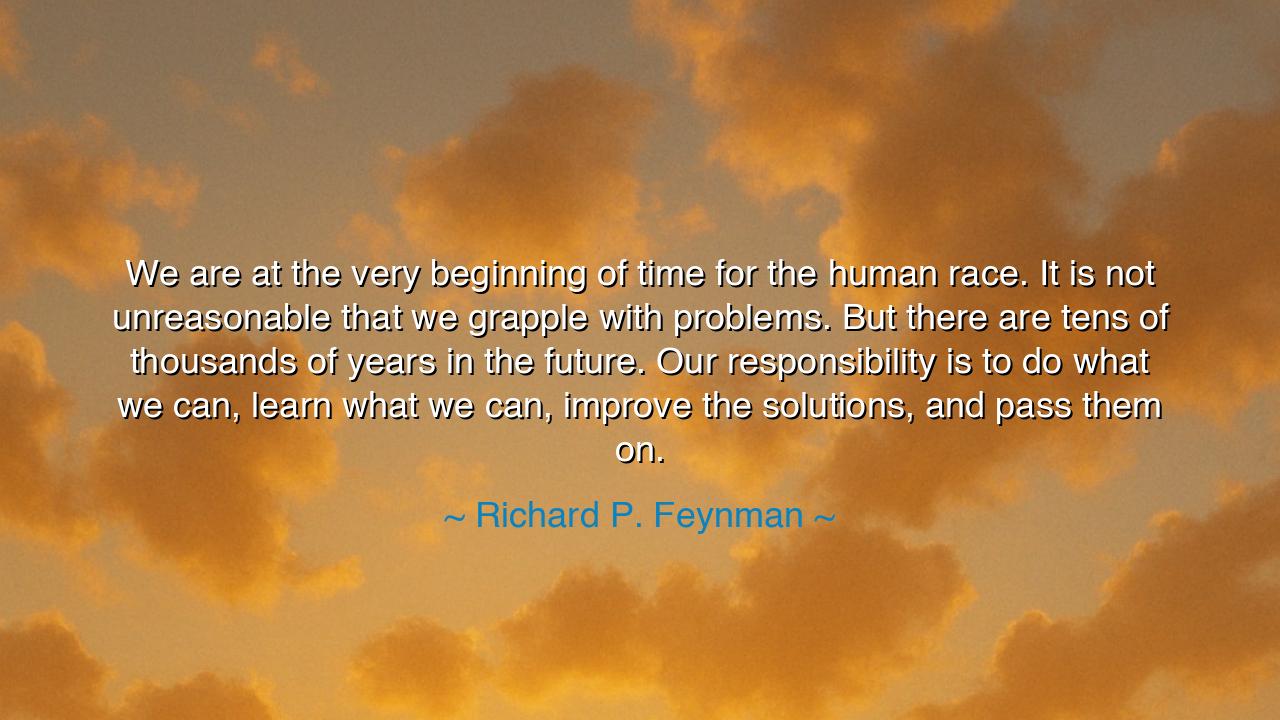
We are at the very beginning of time for the human race. It is
We are at the very beginning of time for the human race. It is not unreasonable that we grapple with problems. But there are tens of thousands of years in the future. Our responsibility is to do what we can, learn what we can, improve the solutions, and pass them on.






In the grand expanse of time, there exists a vast horizon before us—a horizon that stretches far beyond our individual lives and the present struggles we face. Richard P. Feynman’s words, "We are at the very beginning of time for the human race. It is not unreasonable that we grapple with problems. But there are tens of thousands of years in the future. Our responsibility is to do what we can, learn what we can, improve the solutions, and pass them on," reflect a profound understanding of the human condition. They remind us that struggles are an inevitable part of our journey, but that our true task is not to solve every problem in a single lifetime, but to contribute to the ongoing progression of knowledge and wisdom, ensuring that the work we do today benefits generations to come.
The ancients recognized that their actions were but moments in the grand timeline of human history. The Greeks, in their philosophy, often viewed their lives as part of a larger cosmic order. For them, wisdom was passed down not only for the benefit of the present, but as a legacy for the future. The great philosophers like Socrates and Plato knew that the ideas they discussed would not be fully understood or implemented in their own lifetimes. They believed in a long-term vision of human flourishing, one that required continuous learning, growth, and the passing on of knowledge. Feynman’s reflection echoes this ancient wisdom, emphasizing the importance of improvement and the sharing of solutions for the betterment of the future.
Consider the great pyramid builders of ancient Egypt, whose monumental work stands as a symbol of what can be achieved when individuals dedicate their efforts not just to their own time, but to something far greater. These workers, though largely unknown, contributed to one of the most enduring symbols of human achievement—the Great Pyramid of Giza. Their labor was not just for immediate gain, but for a future where the greatness of their civilization would endure for millennia. Much like Feynman’s insight, the ancient Egyptians understood that their work was a piece of a larger puzzle, one that would continue to evolve and be understood by generations long after they had passed.
The same lesson can be drawn from the life of Leonardo da Vinci, whose inventions and art were ahead of their time. Though his works were often unappreciated or unrealized in his lifetime, da Vinci’s contributions laid the groundwork for scientific and artistic revolutions in centuries that followed. His sketches of flying machines and anatomical studies, though groundbreaking, were not immediately understood, yet they would eventually be realized by others. Da Vinci’s life reminds us that our responsibility is to contribute what we can in the moment, and trust that the work we begin today will be completed by those who come after us.
Feynman’s vision, too, connects with the ancient concept of legacy—that what we build now must be constructed with an eye to the future. The Romans, for instance, built roads, aqueducts, and cities that were designed not only for the needs of their time, but also to serve future generations. Marcus Aurelius, in his Meditations, reflected on the importance of impermanence and the understanding that we are merely passing through time, leaving marks for those who will follow. His view of humanity as part of an ongoing cycle of learning and growth aligns with Feynman’s call to improve and pass on knowledge for the betterment of the future.
Feynman’s words offer us a timeless lesson: that the challenges we face today are not final, but part of a continuous process. As individuals, we must do what we can in the present, but we must also approach life with the knowledge that future generations will build upon our work. Our legacy is not in our own immediate achievements, but in how we contribute to the greater movement of human progress. In this way, every struggle becomes part of a larger narrative, one where each of us plays a role in shaping the world that will exist long after we are gone.
The lesson from Feynman is one of humility and hope. While we may not be able to solve all the world’s problems in a single lifetime, we have the power to contribute in meaningful ways. We must embrace the responsibility to learn, to improve, and to pass on the knowledge we gain so that those who come after us are better equipped to face the challenges that lie ahead. Like the ancient philosophers, we must acknowledge that we are part of a much larger story—a story that will unfold for centuries to come. Let us then live our lives with purpose, knowing that our contributions, no matter how small they may seem, are part of a vast, ongoing journey that will carry the human race forward into an unknown but hopeful future.






AAdministratorAdministrator
Welcome, honored guests. Please leave a comment, we will respond soon